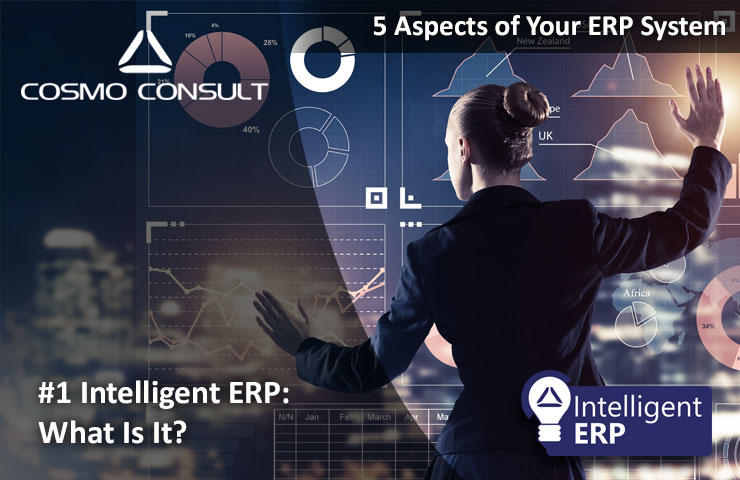Intelligent ERP: What Is It?

Intelligent assistants are expanding the potential of conventional ERP systems. The aim is to exploit existing business data for predictions and optimizations, save costs and work more efficiently. Intelligent ERP systems are not a random innovation. COSMO CONSULT is reacting to a rapidly growing demand as many company solutions are no longer fully satisfying increasing operational requirements. Three examples:
- Classic ERP systems act on the basis of manually established rules. For example, orders are always triggered when a certain reorder level is met. The problem: It is not possible to react to short-term changes in the framework conditions in dynamic markets with such simple mechanisms.
- Lists are sorted according to historically established priorities and heuristics. They are often the only software-supported basis for allocating critical resources in production planning. The problem: Conflicts involving competing objectives can therefore only be mapped to the extent of a weighing-up process with lots of alternative actions.
- The quality of predicted delivery dates often depends on the experience of individual employees. The problem: With fully utilized production systems and complex interdependencies, sound estimates are almost impossible and purely a matter of luck.
As you can see, intelligent assistants for prediction and optimization speed up operational decisions while simultaneously increasing precision. Intelligent ERP systems also signify more security and reliability in planning processes.
Use Resources from the Cloud
In terms of technology, an intelligent assistant is a cloud service that derives recommended actions from information on the ERP system based on a mathematical model. Secure data exchange takes place via a connector, which guarantees virtually seamless interaction between individual components. Data quality, results, and key performance indicators for predictions and optimizations are compiled transparently on dashboards.
The framework outlined exploits the strengths of classic ERP systems: tried-and-tested data in a clear context and standardized processes with distinct objectives. The latter are an important basis for mathematical models. The cloud and connector ensure that sufficient processing power is provided depending on actual requirements and on a scalable basis. This means the pitfalls in the field of data science can be circumvented. The IT resources required for this are often underestimated. Companies therefore benefit from a manageable level of IT complexity, low investment costs and a consistent pool of mathematical models.
What You Need to Know About Intelligent ERP Systems
In our new blog series, we introduce you to the most important facets of intelligent ERP systems. You will find out how you can benefit from these solutions in your process or discrete manufacturing company, how they relate to data science, and what skills your employees need to drive your business forward.
Would you like to know more? Then simply register for our webinar. You will also have the opportunity to ask any questions you may have. Don’t have time to make it to the session? Don’t worry, leave us your contact details, give us a call, or send us an email. We’ll be happy to discuss how your company can benefit from an intelligent ERP system.
